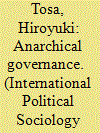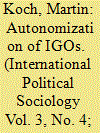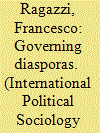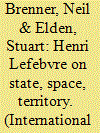|
|
|
Sort Order |
|
|
|
Items / Page
|
|
|
|
|
|
|
| Srl | Item |
| 1 |
ID:
092298


|
|
|
|
|
| Publication |
2009.
|
| Summary/Abstract |
Beside the promotion of a politics of inclusion, implemented by governing at a distance, the global governmentality also promotes a politics of exclusion, such as establishing targeted governance that is aimed at deviant groups at the periphery of global politics. This highly disciplinary social control that is imposed upon the marginalized population sometimes leads to instances of the state of exception, in which people are forced to endure "bare lives." This kind of exception existing at the marginalized periphery of the neoliberal global governmentality becomes normal. This neoliberal governmentality creates an informal sector of an enormous scale, whose spatial representation is the global slum, and where vicious cycles of violence become normal.
|
|
|
|
|
|
|
|
|
|
|
|
|
|
|
|
| 2 |
ID:
092300


|
|
|
|
|
| Publication |
2009.
|
| Summary/Abstract |
This article attempts to explain how international governmental organizations (IGOs) become autonomous. It argues for a conceptual shift to an organizational studies perspective that puts the concept of the organization at the center of attention. Although some approaches in IR already apply particular organizational theories, an open-system perspective offers a promising representation of IGOs, their internal dynamics, and external relations. Within an open-system perspective, modern system theory is useful for examining how autonomization processes can be explained by taking into account the momentum of self-referential closure on the basis of decisions.
|
|
|
|
|
|
|
|
|
|
|
|
|
|
|
|
| 3 |
ID:
092296


|
|
|
|
|
| Publication |
2009.
|
| Summary/Abstract |
The study of migration in general and in IR in particular has generally meant the study of immigration. Yet, sending states increasingly manage and govern numerically impressive "diasporas" abroad. This article assesses the importance of the government of emigrants and diasporas, and reviews the meager theoretical literature on the topic. It then proposes a theoretical framework based on the concept of governmentality and outlines some avenues for further research.
|
|
|
|
|
|
|
|
|
|
|
|
|
|
|
|
| 4 |
ID:
092294


|
|
|
|
|
| Publication |
2009.
|
| Summary/Abstract |
In this article, we offer an account of how the French Marxist philosopher and sociologist Henri Lefebvre can be read as a theorist of territory. While Lefebvre's writings on state space have generated some interest in recent years, the territorial dimensions of his thinking on this issue have not been explored. Meanwhile, the question of territory has been oddly undertheorized in the post-1970s literatures on international relations and spatialized political economy. Against this background, we suggest that Lefebvre's work contains some insightful, if unsystematic, observations on the relationship between states, space and territory. Following consideration of Agnew's (1994) influential injunction that social scientists transcend the "territorial trap," we develop this reading of Lefebvre with reference to three key dimensions of his approach to state space as territory-first, the production of territory; second, state territorial strategies; and third, the "territory effect," namely, the state's tendency, through its territorial form, to naturalize its own transformative effects on sociospatial relations. Thus construed, Lefebvre's approach productively raises the issue of how the territorial trap is actually constructed and reproduced.
|
|
|
|
|
|
|
|
|
|
|
|
|
|
|
|
| 5 |
ID:
092297


|
|
|
|
|
| Publication |
2009.
|
| Summary/Abstract |
Moving beyond the political framework of both Hobbes and Schmitt that privileges a centralization of power as a way of dealing with the fear of violent death, this article turns to Foucault's discourses of war, power over life, and governmentality to illuminate the contemporary reproductive potential of fear in exercises of preservation of life in society. The decentralization of fear and power in governmentalized modernity encourages various public agents/agencies to mobilize the specter of danger, threat, insecurity, or enmity to normalize populations. This article reflects on the effects of this (re)productive mobilization of fear and emphasizes the proliferation of dispositifs of terror that engender a fear of not being able to live one's normal life.
|
|
|
|
|
|
|
|
|
|
|
|
|
|
|
|
|
|
|
|
|